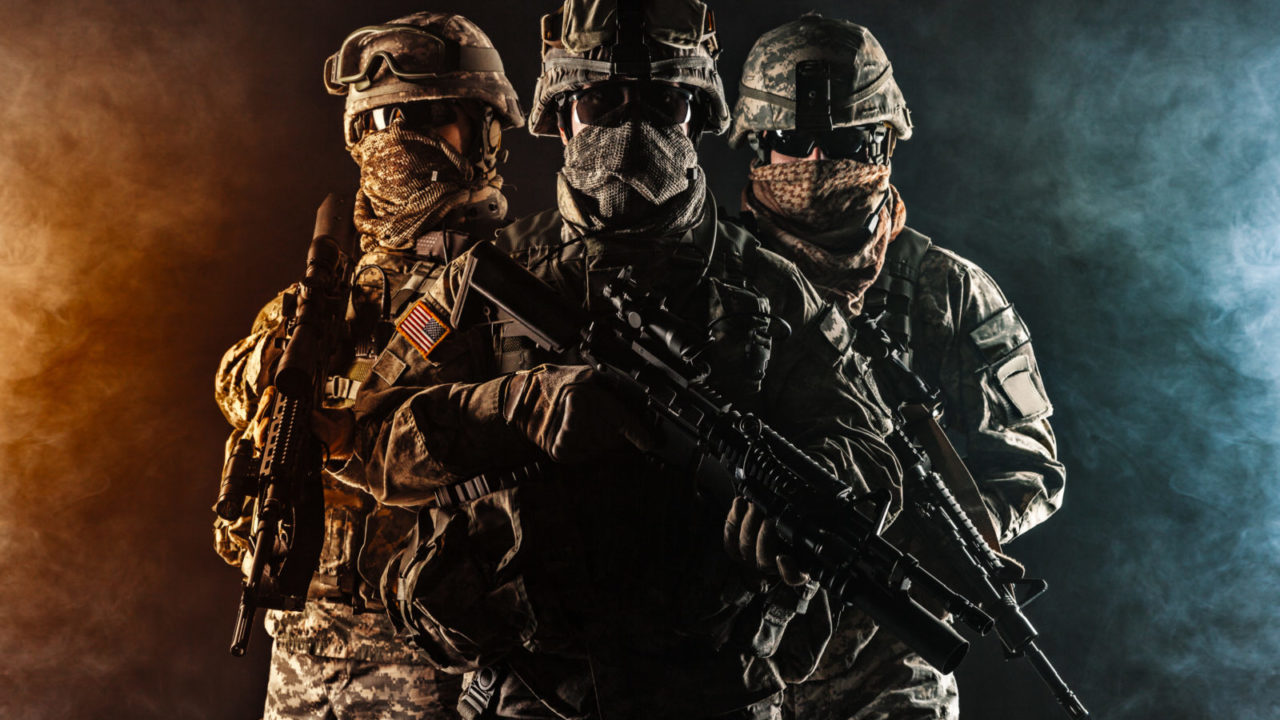This first appeared in The Havok Journal in January 2017.
____________
Author’s Note: When it comes to terrorism, U.S. foreign policy and military operations, the true nature of Islam, and the extent of Islamic radicalization, there are no shortages of opinions. As a survivor of the 9/11 attacks and a former soldier, I certainly had my own. But when it came to discussing Islam intelligently, I had more questions than answers. Frustratingly, most interviews I’ve read or seen were apologias for Islam; of course, a few were reflexively anti-Islamic shoutfests.
So it was with an eye towards conducting a challenging, clarifying conversation that I asked Sayed and Deen, two Muslim-American veterans, to sit down and talk with me. We bonded quickly, the way soldiers do, over jokes, bullshit, and some shared bitching. I was impressed with their thoughtfulness and their passion. But our goal was understanding, not agreement. I found, in their answers, cause for both optimism and concern.
This interview is hardly the final answer on many of these subjects — we spoke for three hours and we could have spoken for twelve. But hopefully, over the course of this nine-part interview, we’ve managed to shed a little more light than heat on a range of subjects that sorely need it.
This is Part 2 of a nine-part series. You can start the series from the beginning here.
_______
CPM: Let’s talk about women’s rights. Does Islam respect women’s rights as they’ve been established in the West?
Deen: The Koran, and bear with me because I don’t know the exact verse, says women must dress “modestly.” Well, how do you interpret modesty?
A big problem is that a lot of culture is bleeding into the religion. If you go to Pakistan, if you go to Saudi Arabia, if you go to Indonesia, if you go to Yemen — you name the Muslim country — you’ll see some women wearing the hijab, some wearing the niqab. But in Saudi Arabia, for example, the culture is male-dominated. It’s not the religion that’s demanding the clothes, it’s the culture and the culture is seeping into the religion.

Sayed: Many of the laws that are perceived to see women as unequal, if you look at them contextually, they were from a time when safety was a big thing. They had to guarantee those rights. They had to make sure the women were safe.
There’s actually a poem that taught me how important a woman is: “As a mother, heaven is under her feet. As a wife, she is half the faith. As a daughter, she is a blessing.” If you break that down, a mother’s role is so important for a child. It’s not figurative — it’s literally heaven under your mother’s feet.
In the Hadith, there’s the story of a man who went to the Prophet and asked him, “Who, in terms of people, should have my companionship?”
The Prophet told him, “Your mother.”
The man asked, “Who next?”
The Prophet said, “Your mother.”
“Who next?”
“Your mother.”
“Who next?”
Finally — “Your father.”
So every Muslim man is a mama’s boy because, at heart, we have to respect our mothers three times before anyone else. For me, just coming to this interview, I had to ask my mom, “Hey, mom, are you okay with me going out this far?” She said, “Yes.” If she said no, I wouldn’t be talking to you. That’s exactly how important it is.
I’m not married, but if I was married, anything my wife owned, whether she’s a millionaire or earns a dollar a year, is legally hers. I cannot touch it. As a wife, you belong to your spouse. And I belong to my wife. Not belong as property but belong in terms of we have rights. It’s my job to guarantee and ensure her rights and vice versa.
Islam condemns infanticide of girls. It is one of the most horrific sins you can commit.
Islam tells you women are a blessing. A man who raises a righteous daughter, it can be an entry for him into heaven. Someone who has nothing but daughters, four daughters or more, is called, by translation, “father of the praiseworthy.”
Women have more rights in Islam today than they do anywhere else in the world. In Islam, women have the right to be educated. They have rights in both marriage and divorce. Islam actually forbids arranged marriages, but if you look at the majority of the “Muslim world,” you’ll see it is nothing but arranged marriages. But if you look at India and Pakistan there are non-Muslims who also do arranged marriages because it’s a cultural thing.
The problem is that the ignorance and culture bleed into the religion and does set women’s rights back.
Deen: It’s understandable how the average American would not understand that and get confused. But in Islam, women are actually held to the highest degree, the highest standard. If you look at the Prophet Mohammad, Peace Be Upon Him (PBUH), he was married to an older woman and she made more money than him. She had her own business. But the West doesn’t really see that because it sees the culture — the male-dominated culture — suppressing women.
CPM: Well, as recently as the 1970s, you can see pictures of women in Afghanistan wearing miniskirts or women in Egypt dressing in what Americans would consider a very modern way. And now you don’t.
So what caused the shift in the cultures of these countries? What has made them so much more conservative today? Or is this a return to “true” Islam?
Sayed: It’s not true Islam. It’s radicalization. It’s ignorance. Imagine that town from “Footloose —”
CPM: (laughing) — I always do —
Sayed: OK, so imagine if they struck oil and had nothing but petro-dollars. They could fund their brand of conservatism, where “no dancing” would eventually lead to “no wearing of colors,” “no music,” — none of this stuff.
It’s ignorance. When you are the most educated person in the entire village, and you have a fourth-grade-dropout level of education, and then you start preaching to poor dirt farmers about the Koran, there’s going to be a problem.
What we’re seeing, since the 1970s, is Wahhabi climbing the ladder in the Arab states. There is a propaganda battle in Islam where a lot of the Wahhabi are reprinting the Hadith, changing it over time, subtly, to the point where you pick up two Hadiths and one is completely accurate and the other, published by the Wahhabi, is not only incorrect but it can actually lead you to extremism a lot quicker than the one that is correct.
CPM: That’s the Noble Koran, right?
Sayed: I believe that’s the one. When unchecked, radicalism and conservatism come together and they lead to women who aren’t even Muslim wearing niqabs.
CPM: So, when you look at how much culture infringes on your religious doctrine and perverts it, doesn’t that piss you off?
Deen: Yes. Being in the military, the intel world, the contractor world, and all that shit, I look at Islam, and then I look at what’s going on with our Arab coalition, and wonder, “Well, why isn’t anything getting done?” The reason is — who is the “Arab coalition?” The controlling group — the coalition leader — is Saudi Arabia!
Saudi Arabia is in an apostate regime. There is no monarchy in Islam. There are no kings. There are no queens. Yet, our number one partner is a king and a queen and a repressive regime. Our allies are all repressive regimes. This was going to happen sooner than later in that area, we just sped it up exponentially.
CPM: What do you mean, “this was going to happen?” Do you mean the radicalization?
Deen: The radicalization. I mean, you look at Islam’s enlightenment during Prophet Mohammad’s (PBUH) time — that was when the West was in their Dark Ages. Then Islam had its problems after Prophet Mohammad died and it got kind of split — I’m making this really short and really brief, you know?
CPM: Yeah, of course.
Deen: So, leaving a lot of stuff out, the West came out of the Dark Ages and had the Renaissance and the Enlightenment and all that. Well, Islam is now in its dark period.
Look at Libya. Libya is a complete mess. Same with Iraq and Afghanistan. The people that we send back, like the new Afghani president, Ashraf Ghani, he’s from here. [Note: Ghani was born and raised in Afghanistan, but taught and lived in the US for 24 years.] You can’t keep sending ex-pats back to these countries.
If you look at Saudi Arabia, Saudi Arabia is saying, “We are the protectors of Mecca because it’s in our bloodline. We’re going to make this place very religious.” But look at some of the kings, the princes and the princesses, when they leave the country, they don’t act in accordance with Islam — they don’t follow what they expect their citizens to live up to.
Sayed: …Right, like in LA recently.
Deen: As I said, in Islam, there are no kings and queens. Why do you have Queen Rania of Jordan sitting on TV saying, “Oh, we are moderate Islam?” If the United States keeps with this, it will lose everything in that area.
CPM: So, is it that religion and culture become aligned because religion and the state are intertwined? Is theocracy the problem?
Sayed: No, because, from what I’ve learned, Islamic theocracy can’t survive in the modern era. You don’t have a proper Islamic theocracy. What you have is a dictator who comes under the guise of a king, a queen, an emir, a president, a prime minister, a “dear leader” — and aligns him or herself with Islam. He’ll claim, “Oh, I’m a dedicated Muslim,” but if you badmouth him, then you’re opposing “Islam,” so you get taken out.
CPM: Where do you see or where have you seen Islamic theocracy work?
Deen: Look at King Saud. He inherited this huge Kingdom. What was he going to do? He wanted to keep power. The House of Saud is going to do everything in its power to do that. If that means to bastardize Islam — which they are doing a great job at — that’s what they’re going to do.
Growing up here in the United States and going to different mosques and listening to different sermons all my life, I’ve never really heard anyone say anything about the Saudi government. No one is saying, “What makes you the protectors? There is no lineage. There are no kings and queens. Why are you still in existence?”
Sayed: One man who, in my book, is a hero was that customs agent who stopped the 20th hijacker from coming into the US. [Note: Jose Melendez-Perez.] He wouldn’t let this Saudi guy into the country even though his supervisors were pressuring him to let the guy go. It turned out that Mohammad Atta was waiting to pick up the Saudi outside the airport. But if it had been up to the supervisors, they would have let him in because he was Saudi, he was connected.
I don’t know why we, as Americans, don’t stand up to Saudis.
So, to your question, yeah, it does upset me to see radicalism and ignorance take over the faith.
But, at the end of the day, I am an American Muslim, so I really don’t have a place telling an Egyptian Muslim, “Hey, you got to get your stuff in order. Your government is corrupt. They’re supporting terrorism.” That’s like me coming to your house and saying you should really change — I don’t have the authority to do that.
The best way to fight radicalization is through education. Who is countering these extremist madrassas that are all over the place? Even the Saudis realize the issue because the last king modernized education at King Saud University. Religious police are not allowed to go onto that campus. Girls can wear whatever they want. There’s no hijab required. Guys don’t have to wear beards. I’ve heard from people from that part of the world that it’s like an American college campus, virtually an oasis in the desert. It’s focusing on science and technology.
When it comes to fighting against extremist madrassas, I know it can be sticky because we can’t fund religious operations in the United States and we have to separate church and state. But it’s going to come to a point where we’re either going to have to do it through a front company or something to counter this brainwashing and ignorance.
_______
Chris writes regularly at The Havok Journal in addition to hosting The Weekly Havok podcast. He is a former nightclub bouncer, firefighter, corporate security trainer, and prison chaplain. He has done stand-up, been homeless for extended periods of time, had screenplays optioned, and gotten married. He was also in the military and spent 33 months in foreign combat zones, earning a Bronze Star in Afghanistan. He has written one book, edited another, and is working on a third. He can be reached at Savage Wonder.
Buy Me A Coffee
The Havok Journal seeks to serve as a voice of the Veteran and First Responder communities through a focus on current affairs and articles of interest to the public in general, and the veteran community in particular. We strive to offer timely, current, and informative content, with the occasional piece focused on entertainment. We are continually expanding and striving to improve the readers’ experience.
© 2024 The Havok Journal
The Havok Journal welcomes re-posting of our original content as long as it is done in compliance with our Terms of Use.



